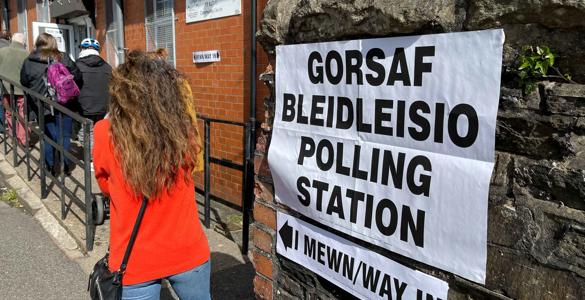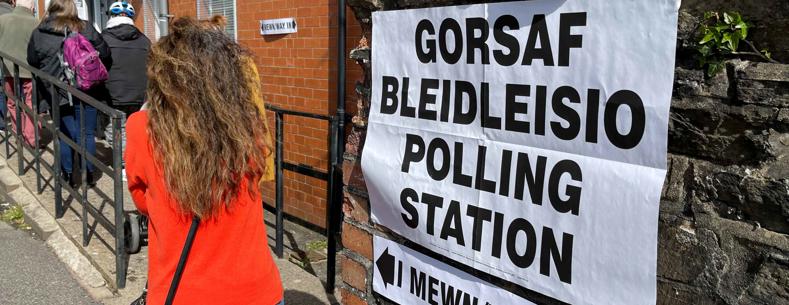Voter turnout at the last Senedd Elections in 2021 was 46.6%. This was the highest ever turnout in a Senedd election, but it means that 53%of people did not vote. Turnout at local government elections in Wales in 2022 was only 38.7%down 4%since 2017.
The Welsh Government has been developing proposals to increase voter turnout and engagement in Welsh elections. It introduced the Elections and Elected Bodies (Wales) Bill to the Senedd in October 2023. The Bill sets out a range of proposals aimed at changing when, how and who votes in Welsh elections. Our Bill summary sets out the Bill’s proposals in detail.
The Senedd will vote on whether to support the general principles of this Bill on 6 February. This article examines some of the Bill’s key proposals and the evidence heard both for and against them.
Automatic voter registration
One of the Bill’s key proposals is to pilot and then introduce automatic voter registration. Voters in the UK currently need to register to vote themselves. Under the Bill’s proposals Electoral Registration Officers (EROs) will be required to automatically register eligible electors. Voters will be issued with a ‘Notice of Registration’ and will have 45 days to object to being included on the register. They can also apply to request anonymous registration. If introduced, this change will apply to Senedd, Welsh local government elections and devolved referendums. Electors will still need to register to vote in UK general elections and Police and Crime Commissioner elections.
The case for making the change
The Welsh Government says the current system of requiring voters to register “does not reach all electors”. It says data by the Electoral Commission shows 260,000 eligible electors had not registered to vote in 2022, 9.9%of those eligible.
The Senedd’s Local Government and Housing Committee has been considering the Bill. The Electoral Commission, Electoral Reform Society Cymru and academics told the Committee they support the proposal. Dr Christine Huebner said that registration was one of the biggest barriers to participation for 16 and 17 year olds in the 2021 Senedd elections.
Risks that need addressing
The Committee also heard evidence about a number of risks that will need careful consideration during any piloting of the approach.
Voter confusion at different systems for registering in UK-wide and Welsh elections was raised as an issue. Proper resourcing for electoral officials and the need for a clear communication in accessible formats were highlighted as essential considerations.
Potential risks to vulnerable voters is raised as another issue by stakeholders. Organisations such as RNIB Cymru, Disability Wales and the Women’s Equality Network Wales (WEN Wales) are concerned that the 45 day notice period to object to being registered, or apply for anonymous registration, may not be enough time. WEN Wales said a requirement for voters to apply annually to remain anonymous could cause unintended trauma and risk for survivors of domestic abuse, stalking or harassment.
The need for ERO’s in Wales to have adequate access to data sets, to assess who is eligible to vote, is another issue raised by academics, electoral officials and the Electoral Commission.
In its findings on the Bill, the Committee recognises the overwhelming support to the principle of automatic voter registration but feels “strongly that automatic registration should only be implemented if the safety of vulnerable electors is guaranteed”. The Committee makes seven recommendations to address issues it identified.
What other proposals does the Bill make and what has the response been to them?
The Bill includes a number of other proposals aimed at increasing participation in Welsh elections.
The Bill would give powers to Welsh Ministers to establish a new online information platform on Welsh elections. The Welsh Government says it could include information such as the role of governments, practical information on understanding elections, and details on how and when to vote. It also says the website could include “candidate statements and information” and address growing concerns about disinformation online.
ERS Cymru, Disability Wales, RNIB Cymru and academics say an online platform could be a helpful tool for voters looking for information they can rely on. The WLGA questioned the need for platform and whether enough people would use it. Others expressed concern about the inclusion of statements by candidates that could be false or misleading and questioned where responsibility would lie for policing their accuracy.
The Committee agreed the provision of a single online platform could useful for voters, especially new ones. It also recommends that the platform needs to be accessible to all voters and the Welsh Government needs to be clear about who would be liable for the accuracy of information posted on it.
The Bill makes a number of proposals to increase the diversity of candidates standing in Welsh elections. It places a duty on Welsh Ministers to put in place services to promote the diversity of candidates, to establish an Access to Elected Office fund for disabled candidates, and to consider establishing financial assistance schemes for other people with specified characteristics.
There is broad support for these measures. The Committee welcomes them but says the Welsh Government should ensure schemes under the Bill can provide training to assist candidates from under-represented groups deal with abuse or harassment. It also advocates for financial assistance to support unpaid carers to stand in elections.
What’s next?
The Senedd will vote on whether to support the general principles of the Bill on 6 February. If the Senedd decides to support the Bill, then Senedd Members will be given an opportunity to amend the Bill before a final vote takes place. You can find out more about the next stages for the Bill in this guide on making law in the Senedd.
The Senedd’s Local Government and Housing Committee made 27 recommendations on the Bill. The Bill was also considered by the Senedd’s Legislation, Justice and Constitution Committee and the Finance Committee, who also made recommendations for changes.
It is now for the Welsh Government to decide whether to accept or reject these recommendations.
The people of Wales could be voting for a very different Senedd in two years time if the Welsh Government’s proposals to reform the Senedd are adopted. The question will be whether the measures proposed in this Bill will succeed in encouraging more people in Wales to head to the polls.
Follow the debate live on 6 February on Senedd.tv
Article by Nia Moss, Senedd Research, Welsh Parliament






